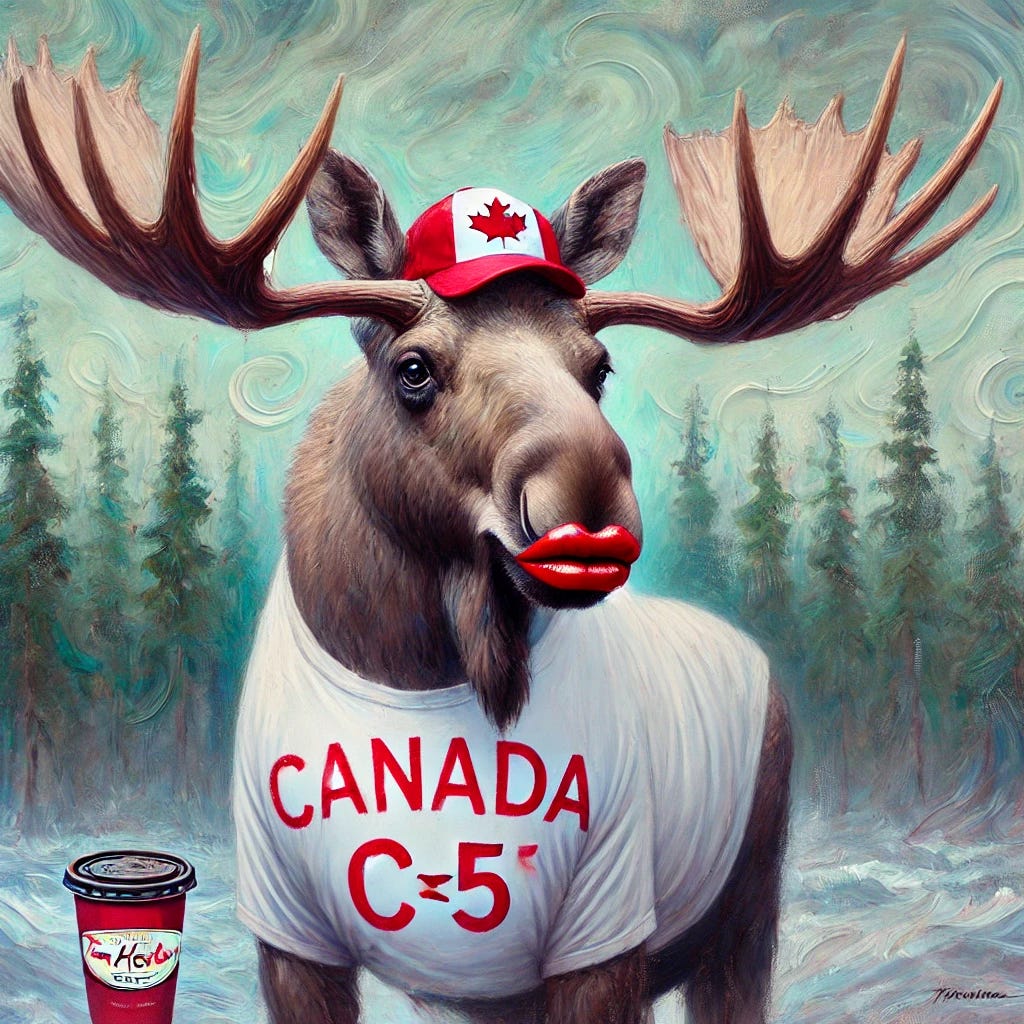The Stoner Who Fails His Exams
How Canada shows up to the global economy half‑asleep, apologises for its advantages, and wonders why it’s falling behind.
If you believe in the importance of free speech, subscribe to support uncensored, fearless writing—the more people who pay, the more time I can devote to this. Free speech matters. I am a university professor who was just fired for criticising Hamas - so I am not speaking from the bleachers.
Please subscribe to receive at least three pieces /essays per week with open comments. It’s $6 per month, less than USD 4. Everyone says, "Hey, it’s just a cup of coffee," but please choose my coffee when you come to the Substack counter.
Cheers.
By any serious metric, Canada ranks about 19th richest globally—gentlefolk’s mid‑table. Yet look at who has surged ahead: Ireland now exceeds us in GDP per capita, and Malaysia and South Korea—modern industrial powers we once tutored in grain‑aid—are accelerating past.
Norway lounges at the summit with its $1.4 trillion sovereign wealth fund. Where are we? Embarrassed, apologetic, self‑flagellating.
Homer Simpson once dubbed us “goodie‑goodie two‑shoes Canada.” Indeed, we are—and uniquely so.
We’re the only top‑six country in oil & gas, minerals, forestry, agriculture, yet also the only one that seems mortified to strut under its economic trousers.
We pretend to disdain commodities while lugging the world’s resource backpack. We say, “We’d rather be poor and posture, thanks.”
We’re governed by fitness fanatics who demean sugar and doughnuts in public, even as they stockpile Twinkies in private—the same class of hypocrite that can’t imagine a national prosperity built from dirt.
Then there’s the ignominious decision in summer 2022, when Germany begged for Canadian liquified natural gas to replace Putin’s exports. We had the gas, the infrastructure potential, and the ally in need. Trudeau waved it off: “No business case.”
The Germans looked astonished; the Americans and Qataris happily scooped the contracts. Meanwhile, Ottawa paid Volkswagen billions to install EV machinery nobody needs in a nation that still imports oil.
It’s like refusing to scan groceries at checkout, then handing cash to the cashier so she’ll buy lunch for you.
Canada’s self‑sabotage is systemic. Our resource sector still contributes some 45% of exports—$212 b in oil, another $85 b mining, $60 b forestry, $57 b agriculture in 2022.
Yet we treat resource development as a national embarrassment, a sin masked in sanctimony. We produce only ~1.5% of global CO₂ emissions—while China, India, and Russia each pump out multiples—but Canada’s virtue signalling achieves nothing but higher living costs and fewer job prospects.
Add to this the endless delays gifted by handing veto rights to provinces and Indigenous groups—vetoes neither granted by the Constitution nor justified by any coherent policy.
It’s “the nice thing to do,” so we do it—accepting that we’ll simply be poorer for the privilege.
The regulatory quagmire is Kafka‑esque: Keystone XL cancelled, Trans Mountain delayed, Frontier mine shelved ($20 billion gone, Teck Resources retreating with tail between legs).
As the Fraser Institute notes, our policy environment now attracts geologists more often than investors. Pipelines are cast as cultural crimes; permits are Olympic obstacle courses. Other countries pump oil; we perform slow‑motion moral suicides.
Look, if you can bear the comparison: Norway, with fewer people than greater Toronto, sits on similar resources and has contrived to build itself a $1.4‑trillion sovereign hoard — a piggy bank so large it could buy Canada twice and still have change for champagne. They export energy without apology, invest with competence, and somehow manage sustainability without the theatrical hair‑shirt routine.
And Canada? We preen. We posture. We miss deals, cancel projects, and squabble like parish busybodies over pipelines while congratulating ourselves on our virtue.
We have mastered the art of looking industrious while producing precisely nothing — the moral pantomime of progress, complete with the smug applause of those too dazed or bored to notice we’ve stood still for decades.
Compounding it all is the cultural neurosis: we fear looking assertive, greedy, or aggressive. We won applause rather than outcomes. We sugarcoat surrender. Meanwhile, other nations charge ahead.
Our per‑capita GDP is already slipping; by 2050, the gap with the U.S. could be 50% according to OECD projections. That’s not alarmism—it’s arithmetic.
Enter Mark Carney, the banker’s banker turned prime minister.
In his book Value(s), he argued capitalism has lost its moral compass, urging seven foundational values: dynamism, resilience, sustainability, fairness, responsibility, solidarity, and humility.
But guess what? Many liberals in Canada are allergic to fairness if it means mining jobs, sustainability if it yields oil royalties, and resilience if it means pipelines.
Unless Carney is willing to turn against the fashionable narratives he’s propped up—as economist and banker—and embrace resource advantage, his Values become velvet handcuffs. Worse, Canadians won’t hold him accountable. We shrug off broken promises in moral delirium rather than demand economic results.
Now comes Bill C‑5, Mark Carney’s so‑called “One Canadian Economy Act,” designed to fast‑track infrastructure and resource projects via order‑in‑council mechanisms. Will Bill C‑5 “accelerate” big projects? Or just give the Liberals more power?
Only in the sense that a man who has never learned to walk imagines he’ll win a marathon by buying faster shoes.
The fantasy here is that Parliament — that dusty chamber of overpaid stenographers — is the obstacle. It is not.
The obstacle is the national psychosis: a reflexive terror of prosperity, a fetish for apology, and the unshakable conviction that any ambitious project must be some kind of moral crime.
We already bypass Parliament when convenient; emergency spending bills are rammed through like fast‑food orders, oversight reduced to press releases.
The bottleneck isn’t the MPs, it’s the culture — the regulatory cult, the provincial vetoes, the endless “consultations” that are less about dialogue than ritual humiliation. You could hand the Cabinet a magic wand and they’d still wave it timidly, begging forgiveness before daring to approve a pipeline.
So no, C‑5 won’t deliver some sudden spasm of competence.
It’s lipstick on a moose: a procedural shortcut for a country that doesn’t want to arrive anywhere. Until Canadians decide they prefer building wealth to performing virtue, every “fast‑track” will end in the same slow‑motion surrender.
This isn’t an isolated drift. As Andrew Coyne has argued in the Globe and Mail, the Trudeau/Carney‑era PMO has become an unelected policy engine, scripting official positions, controlling MPs, and sidelining debate.
Members of Parliament are told what to say, when to say it, and how to toe the party line—reduced to polite stenographers rather than legislators.
The bookish veneer of Canadian governance—Homer Simpson’s “goodie‑goodie two‑shoes Canada”—is eroding beneath this centralisation. It is an executive dominance that grows more anti‑democratic with each session of Parliament.
And we, as a nation? We’re like the stoner who shows up to class but misses every lecture, drifts through with a dazed shrug, and then wonders why his grades tanked.
We boast about our democratic institutions—MPs, committees, parliamentary sessions—yet allow them to be hollowed out. Bills are rammed through, oversight minimised, dissent outsourced.
Meanwhile, Australia, Germany, and India—their officials still respect debate. In Canada? We giggle from the back row, clip on our Canada‑Day buff, and loudly proclaim virtue while watching authority consolidate.
The truth is brutal: we have everything—resources, geography, stable institutions. We have oceans, Arctic potential, the U.S. as a giant neighbour, and the richest patch of farmland on the planet.
Yet we act like an overweight runner afraid of movement, insisting on starving ourselves for moral clarity. We spurn LNG, we cripple pipelines, we shrug at regulations strangling mining deals.
If we continue choosing moral preening over productive action, we’ll remain poorer—punished by our good intentions. We need to stop apologising for being wealthy—grow a pair, embrace our resource-driven economy, regulate sensibly, and start building real prosperity.
There is no virtue in poverty—but there is folly in pretending that poverty is noble.
Canada doesn’t need more sentiment. It needs courage: not to lecture the world, but to compete.
And unless we get it, we’ll watch Norway, South Korea, and Malaysia sprint past, wondering why the richest land on earth chose to walk backwards.
If you found value in this article and wish to support my ongoing work, especially during my 18-month suspension, please consider leaving a tip. Your support helps me continue producing uncensored content on critical issues.









Energy extracted responsibly is better for everyone.